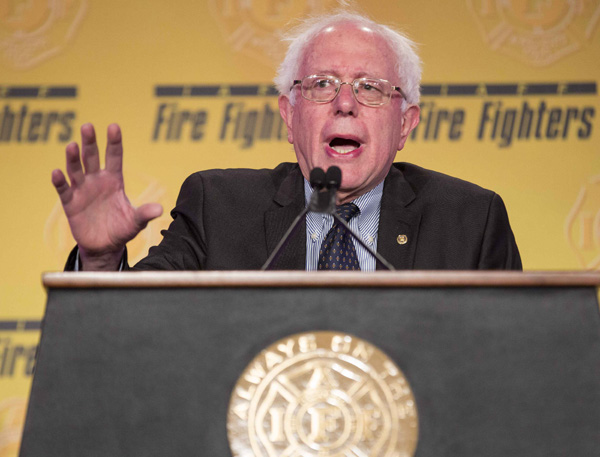US Sen. Sanders to seek Democratic nomination for president
(Agencies) Updated: 2015-04-30 09:05
 |
|
Senator Bernie Sanders (I-VT) addresses the International Association of Firefighters delegates at IAFF Presidential Forum in Washington in this March 10, 2015, file photo. [Photo/Agencies] |
WASHINGTON - Independent US Senator Bernie Sanders of Vermont, a self-described socialist and one of the most outspoken liberals in Congress, will seek the 2016 Democratic nomination for president, he told US media on Wednesday.
"I believe (voters) want a fundamental change so that government works for ordinary Americans and not just billionaires," Sanders told USA Today. He said he would make the announcement official on Thursday.
Sanders also told the Associated Press in an interview he was running for president.
With former Secretary of State Hillary Clinton looming as the front-runner for the Democratic nomination in 2016, few other candidates have stepped forward in the party. Former Maryland Governor Martin O'Malley is expected to enter the race next month.
Sanders told USA Today he can compete by attracting small contributions from millions of Americans and mobilizing young people and other volunteers to help him wage a nationwide campaign.
"I am running in this election to win," he said. "We've got a long path forward. Most people in America have never heard of Bernie Sanders. More than 90 percent of Americans have heard of Hillary Clinton. ... I will absolutely be out-spent. But I do believe we have a chance to raise significant amounts of money through small, individual contributions," he told the paper.
Sanders, who caucuses with Democrats in the Senate, and liberal Democrats such as O'Malley and Senator Elizabeth Warren of Massachusetts are pressing Clinton to move to the left on economic policy by embracing tighter Wall Street regulation and a more robust social safety net.
Sanders, 73, has especially turned up the heat on the former first lady over the Trans-Pacific Partnership and a proposal to fast-track the approval of the 12-nation trade pact.
In a statement last week, Sanders blasted the TPP as a jobs-killer that favors corporations. He then raised questions about where Clinton stands on the issue.






